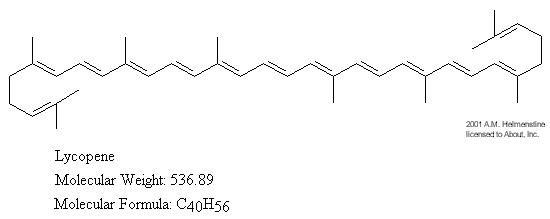The Effects of Lycopene on Your Health
Melissa L. Welter
Increasing consumer expectations that food should provide health benefits beyond simple nutrition is a major driving force in today's marketing atmosphere. In reality, this functionality of food really got started with the discovery of scurvy being a diet-based disease when a physician named Stark (1788) died at the age of 29 after depriving himself of vitamin C for a long period of time. However, credit must first be given to a Scottish physician named James Lind, who in 1753, documented a way to prevent this disease by supplementing the diet of British sailors with lime or lemon juice, giving them the nickname that persists to this day as "limies."
These discoveries went by with little notice, and food was consumed according to tradition, customs, and to simply "fill us up" until the first decade of the 20th Century, when specific elements and their functional properties led to the discovery of vitamins. Much of the research that is carried on today in food functionality and nutrition can be credited to a scientist named McCollum who laid the groundwork for the discovery of vitamins. Some of his decisions led to using rats instead of cows for research on nutrition. Because of his precise methods of carrying on research, interpretations themselves could then be more precise, and led to the method known as biological analysis.
Phytochemicals became a buzzword in the ‘90's with more research concentrating on and relating to a connection between diet and health. Examples are soybean phytoesterols, resveretrol in grapes, lycopene in processed tomato products, and ellagic acid in strawberries, raspberries, almonds, and cranberries, to name just a few. Interest in these phytochemicals (nutraceuticals) spiked when it was shown to aid in the prevention and reversal of prostrate cancer.
The most current buzzword is now "nutraceuticals" which are products that have been isolated or purified from foods which have a demonstrated health benefit when used as dietary supplements. An advertisement seen on television commercials touting vitamins fortified with Lycopene, is an example. Functional foods go hand in hand with nutraceuticals, which are consumed as part of a regular diet, and have demonstrated physiological benefits and/or reduce the risk of chronic disease. The ever popular flaxseed promoted by Dr. Jack Carter of our department, is an example: when ground into meal and incorporated into cereal, bread, or muffins, would be a functional food.
Lycopene is a red carotenoid, which is responsible for the red coloration in tomatoes, watermelon, pink grapefruit, paprika, and rose hips. Unlike several of its carotenoid cousins, lycopene does not have pro-vitamin A acitvity - in other words, it does not get converted into vitamin A. Consequently, the health benefits of lycopene are attributed primarily to its powerful antioxidant actions. In fact, laboratory experiments indicate that lycopene is a more effective antioxidant than other carotenoids, including beta-carotene. Lycopene is especially effective at quenching a free radical called singlet oxygen. Singlet oxygen is a highly reactive free radical formed during normal metabolic processes that reacts with polyunsaturated fatty acids, which are major constituents of cell membranes. Due to the fact that lycopene is commonly located in cell membranes, it plays an important role in preventing oxidative damage to the membrane lipids, thereby influencing the thickness, strength, and fluidity of the membranes. Cell membranes are the gatekeepers of the cell, allowing nutrients in, while preventing toxins from entering and facilitating the removal of cellular garbage. Maintaining the integrity of cell membranes is a therefore key factor in the prevention of disease. In addition to its antioxidant activity, lycopene has been shown to suppress the growth of tumors in in vitro (test tube) and in vivo (animal) experiments. One of the ways that lycopene may limit tumor growth is by stimulating cell to cell communication. Researchers now believe that poor communication between cells is one of the causes of the abnormal growth of cells, a condition which ultimately leads to the development of cancerous tumors.
Lycopene is also believed to play a role in the prevention of heart disease by inhibiting free radical damage to LDL cholesterol. Before cholesterol can be deposited in the plaques that harden and narrow arteries, it must be oxidized by free radicals. With its powerful antioxidant activity, lycopene can prevent LDL cholesterol from being oxidized.

Deficiency Symptoms:
Inadequate intake of lycopene, and other carotenoids, over a period of many years may set the stage for the development of several chronic diseases, including heart disease and various cancers. One important mechanism for this relationship appears to involve free radicals. Research indicates that diets low in carotenoids can increase the body's susceptibility to damage from free radicals. As a result, over the long term, carotenoid-deficient diets may increase tissue damage from free radical activity, and increase risk of chronic diseases like heart disease and cancers.

Toxicity Symptoms:
A high intake of foods containing lycopene is not known to cause any harmful side effects. However, excessive consumption of lycopene can cause a deep orange discoloration of the skin, a harmless condition called lycopenodermia. Although very little is known about the potential for adverse effects from high doses of supplemental lycopene, the Institute of Medicine at the National Academy of Sciences did not establish a Tolerable Upper Intake Level (UL) for carotenoids (including lycopene) when it reviewed these compounds in 2000.
Some research indicates that under certain circumstances, lycopene (and other carotenoids) can become oxidized in the body, and may subsequently behave like free radicals and cause cellular damage. Cigarette smoke, for example, may cause lycopene to become oxidized. This may explain, at least in part, the research findings that cigarette smokers who take carotenoid supplements may have an increased risk of cancer or heart disease.
Impact of Cooking, Storage and Processing:
As the interest in the health benefits of lycopene continues to increase, food scientists and manufacturers have focused a tremendous amount of attention on the impact of food processing on the quantity and bioavailability of lycopene in various food products. Although not all scientists agree, it is generally accepted that the availability of lycopene from tomato products is increased when these foods are processed at high temperatures or packaged with oil. If actually true, this means that your body absorbs the lycopene in canned, pasteurized tomato juice and tomato products that contain oil more easily than the lycopene found in a fresh, raw tomato. It appears that more research is necessary in this area.
Vine-ripened tomatoes have a higher lycopene content than tomatoes ripened off the vine. Studies conducted by Julie Garden-Robinson, Ph.D. Nutritionist, and Ron Smith, Ph.D. Horticulturist, found that lycopene concentrations vary by season, cultural practices, and tomato cultivar.
Factors that Affect Function:
Lycopene is a fat-soluble substance, and as such requires the presence of dietary fat for proper absorption through the digestive tract. Consequently, your lycopene status may be impaired by a diet that is extremely low in fat or if you have a medical condition that causes a reduction in your ability to absorb dietary fat such as pancreatic enzyme deficiency, Crohn's disease, celiac sprue, cystic fibrosis, surgical removal of part or all of the stomach, gall bladder disease, or liver disease.

Lycopene may play a role in the prevention and/or treatment of the following health conditions:
Age-related macular degeneration
Breast cancer
Cardiovascular disease
Cataracts
Cervical cancer
Exercise-induced asthma
Lung cancer
Ovarian cancer
Pancreatic cancer
Prostate cancer
Skin cancer
Stomach cancer

References:
http://micro.magnet.fsu.edu/phytochemicals/pages/lycopene.html